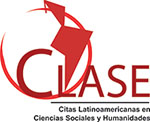Estilos de aprendizaje en los estudiantes de bachillerato
DOI:
https://doi.org/10.23857/dc.v5i1.873Palabras clave:
estilos de aprendizaje, bachillerato, preparatoria, estudiantes, educación.Resumen
Se presenta una investigación documental de carócter exploratorio cuyo objetivo fue analizar las propuestas sobre los estilos de aprendizaje (EA) de los estudiantes de bachillerato que se han planteado en la literatura especializada en los íºltimos 5 años. Para la selección de artículos científicos relevantes se realizó una bíºsqueda en Google Académico con descriptores en idioma español y luego en Scopus con descriptores en idioma inglés. Luego de eliminar duplicados y aplicar los criterios de inclusión-exclusión quedó un total de 36 referencias vólidas (Scopus=28 y GA=8). Los resultados precisaron 7 tipos de propuestas en los EA de los estudiantes de bachillerato, donde 3 propuestas comparan los EA con diferentes variables (TICS, pedagógicas y psicológicas), siendo estas propuestas una tendencia importante del 69,44% (25 artículos), por otro lado, existen propuestas minoritarias como identificar preferencias entre EA, identificar EA a través de instrumentos, estrategias para el desarrollo de EA y describir EA. Se concluye que la literatura reconoce la importancia de las TICS, la pedagogía y la psicología para entender mós de cerca la complejidad de los EA de los estudiantes de bachillerato, en aras del éxito académico en el aula. El reto actual de los docentes, inicia en el reconocimiento de las características innatas que tiene cada uno de sus estudiantes para aprender y asimilar información de su entorno, saber que todos los estudiantes pueden aprender fócilmente cuando se conoce los EA y diseña e implementa actividades pedagógicas acorde a los EA de sus estudiantes, es decir se requiere innovar de forma permanente y fortalecer vínculos afectivos para obtener mejores resultados.
Citas
Abdu Saadi, I., Ali Alharbi, M., & Watt, A. P. (2013). Assess learning styles profile of High and Low Arabic reading achievement in preparatory schools students in Saudi Arabia. Life Science Journal, 10(2), 2230-2238. Recuperado de http://www.lifesciencesite.com/lsj/life1002/310_18962life1002_2230_2238.pdf
Abrahams, A. S., & Singh, T. (2013). Expeditionary Learning in Information Systems: Definition, Implementation, and Assessment. Decision Sciences Journal of Innovative Education, 11(1), 47-75. https://doi.org/10.1111/j.1540-4609.2012.00369.x
Aguillo, I. F. (2012). Is Google Scholar useful for bibliometrics? A webometric analysis. Scientometrics, 91(2), 343-351. https://doi.org/10.1007/s11192-011-0582-8
AlemdaÄŸ, C., AlemdaÄŸ, S., & í–zkara, A. B. (2018). The Analysis of Sports High School Students’ Learning Styles in Terms of Overall Academic Success. TED EĞİTÄ°M VE BÄ°LÄ°M, 43(195), 269-278. https://doi.org/10.15390/EB.2018.7327
Banić, B. (2013). The application of multimedia aimed at improving the acquisition of typical topics in natural and social science programs in high schools. Journal of Information and Organizational Sciences, 37(2), 77-87.
Bester, G., & Noke, D. (2016). Variables which relate to the achievement of black high school learners in Afrikaans as a second language | Veranderlikes wat verband hou met swart hoí«rskoolleerders se prestasie in Afrikaans as ’ tweede taal. Tydskrif vir Geesteswetenskappe, 56(2), 641-659. https://doi.org/10.17159/2224-7912/2016/v56n2-2a8
Charmehini, Z. Y., & Makvandi, B. (2016). Relationship between emotional intelligence and learning styles with educational performance in Ahvaz high-school students. Social Sciences (Pakistan), 11(14), 3519-3525. https://doi.org/10.3923/sscience.2016.3519.3525
Cheema, J., & Kitsantas, A. (2014). Predicting high school student use of learning strategies: the role of preferred learning styles and classroom climate. Educational Psychology, 40(11), 845-862. https://doi.org/10.1080/01443410.2014.981511
Cojocnean, D. (2016). Factors determining students’ low usage of mobile tools in their English vocabulary learning | Factores que determinan la baja utilización de herramientas móviles por parte de estudiantes en su aprendizaje de vocabulario en lengua inglesa. Porta Linguarum, (MONOGRAFIC I), 31-43. Recuperado de http://digibug.ugr.es/bitstream/handle/10481/54086/art_3.pdf?sequence=1&isAllowed=y
Delgado López-Cózar, E., Robinson-García, N., & Torres-Salinas, D. (2012). Manipular Google Scholar Citations y Google Scholar Metrics: simple, sencillo y tentador Manipulating Google Scholar Citations and Google Scholar Metrics: simple, easy and tempting. Recuperado de http://pdos.csail.mit.edu/scigen/
Evergreen, M., Cooper, R., & Loughran, J. (2018). The articulation of the development of teacher knowledge during the implementation of new teaching procedures to enhance student understanding of molecular biological concepts. Teacher Development, 22(3), 355-374. https://doi.org/10.1080/13664530.2018.1442875
Fan, K. K., Xiao, P. wei, & Su, C. H. (2015). The Effects of Learning Styles and Meaningful Learning on the Learning Achievement of Gamification Health Education Curriculum. EURASIA Journal of Mathematics, Science & Technology Education, 11(5), 1211-1229. https://doi.org/10.12973/eurasia.2015.1413a
Farfán S, S., Gallardo P, R., Teran P, J., & Alonso G, C. (2010). Aplicación de los Estilos de Aprendizaje para la determinación de los grupos de riesgo en la Carrera de Informática de la UMSA. Journal of Learning Styles, 3(6), 138-152. Recuperado de http://learningstyles.uvu.edu/index.php/jls/article/view/139/98
Garthwait, A. (2014). Pilot Program of Online Learning in Three Small High Schools: Considerations of Learning Styles. Electronic Journal of e-Learning, 12(4), 353-366. Recuperado de http://www.ejel.org/issue/download.html?idArticle=304
Gomez Castro, G., Lopez Dominguez, E., Hernandez Velazquez, Y., Rodriguez Matla, M. Y., Excelente Toledo, C. B., & Pomares Hernandez, S. E. (2016). MobiLearn: Context-Aware Mobile Learning System. IEEE Latin America Transactions, 14(2), 958-964. https://doi.org/10.1109/TLA.2016.7437246
Hemingway, C., Adams, C., & Stuhlsatz, M. (2015). Digital collaborative learning: identifying what students value. F1000Research, 4(74), 1-13. https://doi.org/10.12688/f1000research.6223.1
Huertas, A., López, O., & Sanabria, L. (2017). Influence of a Metacognitive Scaffolding for Information Search in B- learning Courses on Learning Achievement and Its Relationship With Cognitive and Learning Style. Journal of Educational Computing Research, 55(2), 147-171. https://doi.org/10.1177/0735633116656634
Hwang, G.-J., Sung, H.-Y., & Chang, H. (2016). Effects of concept-mapping-based interactive e-books on active and reflective-style students’ learning performances in junior high school law courses. Interactive Learning Environments, 25(7), 877-888. https://doi.org/10.1080/10494820.2016.1224253
Jean, G., & Simard, D. (2013). Deductive versus inductive grammar instruction: Investigating possible relationships between gains, preferences and learning styles. System, 41(4), 1023-1042. https://doi.org/10.1016/j.system.2013.10.008
Kidanemariam, D. A., Atagana, H. I., & Engida, T. (2014). Do learning styles influence students’ understanding of concepts and academic performance in chemistry? Mediterranean Journal of Social Sciences, 5(16), 256-260. https://doi.org/10.5901/mjss.2014.v5n16p256
Kim, T.-Y., & Kim, Y.-K. (2014). A structural model for perceptual learning styles, the idealL2self, motivated behavior, and English proficiency. System, 46(1), 14-27. https://doi.org/10.1016/j.system.2014.07.007
Langbeheim, E., Safran, S. A., Livne, S., & Yerushalmi, E. (2013). Evolution in students’ understanding of thermal physics with increasing complexity. Physical Review Special Topics - Physics Education Research, 9(2). https://doi.org/10.1103/PhysRevSTPER.9.020117
Mantilla-Falcón, L. M. (2016). Los Estilos De Aprendizaje En Estudiantes De Bachillerato De Una Unidadeducativa Ecuatoriana . Un Estudio De Caso Learning Styles For Baccalaureate Students In Ecuadorian Schools . A Case Of Study. Revista Acadí©mica Augusto Guzzo, (17), 21-30. Recuperado de http://www.fics.edu.br/index.php/augusto_guzzo/article/view/326/408
í–zyurt, í–., í–zyurt, H., Baki, A., & Gí¼ven, B. (2013). Integration into mathematics classrooms of an adaptive and intelligent individualized e-learning environment: Implementation and evaluation of UZWEBMAT. Computers in Human Behavior, 29(3), 726-738. https://doi.org/10.1016/j.chb.2012.11.013
í–zyurt, í–., í–zyurt, H., Gí¼ven, B., & Baki, A. (2014). The effects of UZWEBMAT on the probability unit achievement of Turkish eleventh grade students and the reasons for such effects. Computers & Education, 75, 1-18. https://doi.org/10.1016/j.compedu.2014.02.005
Peffer, M. E., Beckler, M. L., Schunn, C., Renken, M., & Revak, A. (2015). Science Classroom Inquiry (SCI) simulations: A novel method to scaffold science learning. PLoS ONE, 10(3). https://doi.org/10.1371/journal.pone.0120638
Quintanal, F. (2017). ¿ Existe relación entre los Estilos de Aprendizaje y la Competencia Mediática? Estudio de caso con estudiantes de física y Química de Bachillerato. Journal of Learning Styles, 10(20), 106-130. Recuperado de http://learningstyles.uvu.edu/index.php/jls/article/download/319/238
Ramírez Gallegos, E. N., Lozano Rodríguez, A., & Zárate Ortiz, J. F. (2017). Los estilos de aprendizaje y el rendimiento acadí©mico en estudiantes de cuarto semestre de bachillerato. Revista de Estilos de Aprendizaje, 10(20), 182-219. Recuperado de http://learningstyles.uvu.edu/index.php/jls/article/download/344/241
Rodríguez Camacho, R. C., Zárate Ortiz, J. F., & Rodríguez Lozano, A. (2016). LOS ESTILOS DE APRENDIZAJE Y LA COMPRENSIóN LECTORA A TRAVÉS DEL USO DEL HIPERTEXTO EN ESTUDIANTES DE BACHILLERATO. learningstyles.uvu.edu, 9(18), 22-42. Recuperado de http://learningstyles.uvu.edu/index.php/jls/article/view/263
Ros Martínez, N. (2015). Influencia de la inteligencia emocional en los estilos de aprendizaje predominantes de los alumnos de bachillerato de la modalidad de Arte. revistas.um.es, 33(2), 53-77. Recuperado de http://revistas.um.es/educatio/article/view/232691
Ros Martínez, N., Cacheiro González, M., & Gallego Gil, D. (2017). Preferencias en estilos de aprendizaje de los alumnos que cursan los estudios de bachillerato en la región de Murcia. revistas.uam.es, 30, 105-117. Recuperado de https://revistas.uam.es/tendenciaspedagogicas/article/view/8124
Sarmiento Bojórquez, M. (2017). Diseño y selección de instrumentos para determinar los diferentes estilos de aprendizaje de los estudiantes de bachillerato de la UAC y su relación con el uso de las. Producción acadí©mica y gestión educativa, 4(8), 1-20. Recuperado de http://www.pag.org.mx/index.php/PAG/article/view/684/894
Subramaniam, V., Yong, C.-C., Melebek, R., & Binti Saidin, S. N. R. (2014). Learning Style among Native Iban Students Based on Their Gender in Acquiring Malay as a Second Language. Asian Social Science, 10(11), 194-200. https://doi.org/10.5539/ass.v10n11p194
Valle Santos, M. (2013). Estilos de aprendizaje y autoconcepto acadí©mico en los alumnos de bachillerato: diferencias entre modalidades. learningstyles.uvu.edu, 6(11), 100-117. Recuperado de http://learningstyles.uvu.edu/index.php/jls/article/view/186
Vaseghi, R., Barjesteh, H., & Shakib, S. (2013). Learning style preferences of Iranian EFL high school students. International Journal of Applied Linguistics and English Literature, 2(4), 83-89. https://doi.org/10.7575/aiac.ijalel.v.2n.4p.83
Vass, G. (2018). «Aboriginal learning style» and culturally responsive schooling: Entangled, Entangling, and the possibilities of getting disentangled. Australian Journal of Teacher Education, 43(8), 89-104. https://doi.org/10.14221/ajte.2018v43n8.6
Wanapu, S., Fung, C. C., Kerdprasop, N., Chamnongsri, N., & Niwattanakul, S. (2016). An investigation on the correlation of learner styles and learning objects characteristics in a proposed Learning Objects Management Model (LOMM). Education and Information Technologies, 21(5), 1113-1134. https://doi.org/10.1007/s10639-014-9371-3
Watson, S. (2013). New Digital Technologies: Educational Opportunities for Australian Indigenous Learners. The Australian Journal of Indigenous Education, 42(01), 58-67. https://doi.org/10.1017/jie.2013.8
Zajacová, B. (2016). Research of Learning Styles–Getting to Know Students’ Individualities. The Anthropologist, 24(1), 35-42. https://doi.org/10.1080/09720073.2016.11891987
Zulfiani, Z., Suwarna, I. P., & Miranto, S. (2018). Science education adaptive learning system as a computer-based science learning with learning style variations. Journal of Baltic Science Education, 17(4), 711-727.
Publicado
Cómo citar
Número
Sección
Licencia
Authors retain copyright and guarantee the Journal the right to be the first publication of the work. These are covered by a Creative Commons (CC BY-NC-ND 4.0) license that allows others to share the work with an acknowledgment of the work authorship and the initial publication in this journal.







